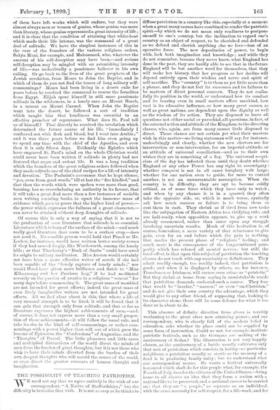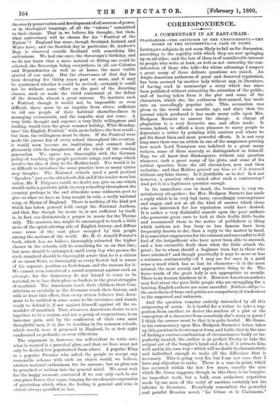THE POSSIBILITY OF TEACHING PATRIOTISM.
W 1, need not say that we agree entirely in the wish of our V V correspondent, "A Native of Staffordshire ;" but the difficulty is to realise that wish. It is not so easy as he thinks to diffuse patriotism in a country like this, especially at a moment when a great many causes have combined to render the patriotic spirit—by which we do not mean only readiness to postpone oneself to one's country, but the inclination to regard one's country as an object of respect, to be cherished and defended as we defend and cherish anything else we love—less of an operative force. The new depositaries of power, to begin with, lack both imagination and knowledge ; and while they do not remember, because they never knew, what England has done in the past, they are hardly able to see that in the future England will be but another word for themselves, that they will make her history, that her progress or her decline will depend entirely upon their wisdom and nerve and spirit of self-sacrifice. The "country" is to them as yet little more than a phrase, and they do not feel its successes and its failures to be matters of direct personal concern. They do not realise fully its position in the world, or understand how its conduct and its bearing even in small matters affect mankind, how vast is its educative influence, or bow many great causes, as well as great nations, are dependent upon the dignity as well as the wisdom of its action. They are disposed to leave all questions not either social or parochial, all questions, in fact, of the external action and attitude of the Kingdom, to the directing classes, who, again, are from many causes little disposed to direct. Those classes are not certain yet what their masters wish in this matter—no living statesman will say, for instance, undoubtingly and clearly, whether the new electors are for intervention or non-intervention, for an imperial attitude, or an attitude of universal conciliation—and as to their own wishes they are in something of a fog. The universal scepti- cism of the day has infected them until they doubt whether England or any other Power has any right to sovereignty ; whether conquest is not in all cases burglary writ large ; whether for one nation even to guide, far more to control another, is not an unwarrantable assumption. When the country is in difficulty, they are apt to become coldly critical, as of some force which they have only to watch ; and when by any chance it is in a quarrel, they often take the opposite side, or, which is much worse, cynically ask how much success or failure is to bring them or cost them in cash. They shrink as if tired from new tasks like the subjugation of Eastern Africa to a vivifying rule, and are half-ready, when opposition appears, to give up a work already commenced, rather than enter upon any struggle involving uncertain results. Much of this hesitation is, of course, benevolent, a mere variety of that reluctance to give pain, even for an end before which the pain is nothing, that marks the present phase of " religious " feeling ; and much more is the consequence of the long-continued pros- perity which has relaxed all mental nerves ; but still, the total effect is that upon this subject of patriotism the teaching classes do not teach with any unanimity or definiteness. They admit readily enough, too readily indeed, that patriotism is good ; and when it is displayed by others, as, for instance, Frenchmen or Irishmen, will excuse even crime as "patriotic." But they shrink at home from saying in unmistakable words that patriotism demands such-and-such a course. They fear that would be "insular," "narrow," or even " un-Christian," and do not give their own country the advantage, which they would give to any other friend, of supposing that, looking to its character alone, there will be some defence for what it has done or is about to do.
This absence of definite direction from above is terribly weakening to the great class now attaining power ; and our correspondent, who is clearly full of the modern belief in education, asks whether its place could not be supplied by some form of instruction. Could we not, for example, institute patriotic festivals, such as the Germans are making of the anniversary of Sedan P The illustration is not very happily chosen, as the anniversary of a battle usually cultivates only that sort of patriotism which consists in hating one particular neighbour, a patriotism usually as sterile as the memory of a feud is in producing family unity ; but we understand what our correspondent means. He wants a festival universally honoured which shall do for this people what, for example, the Fourth of July does for the citizens of the United States,—bring home to all classes an idea that they form a nation with a national life to be preserved, and a national career to be carried on ; that they are "a people," as separate as an individual, with the same necessity for self-respect, for a life-work, and for the steady preservation and development of all sources of power, or in theological language, of all the " talents " committed to their charge. That is, we believe, his thought; but then, what anniversary will he choose for his "Festival of the Nation "? England has none, though Scotland, Ireland, and Wales have; and the Scottish day in particular, St. Andrew's Day, is observed outside Scotland with something like enthusiasm. We had one once, the Sovereign's birthday, and we do not know that a more natural or fitting one could be selected, the Sovereign being everywhere, in all our Colonies and Dependencies as well as at home, the most visible symbol of our unity. But the observance of that day has been decaying for thirty years past or more, and it may be questioned whether it could be revived; certainly it could not be without some effort on the part of the directing classes, such as made the third centennial of the defeat of the Armada almost a great success. To institute such a Festival, though it would not be impossible or even difficult, there must be an impulse from above, sufficient to rid our people of their habitual shamefacedness in managing ceremonials, and the impulse may not come. A very little thought and expense, a very little willingness and leading, would turn the great summer holiday, Whit-Monday, into "the English Festival," with, as we believe, the best result ; but then, the willingness must be there. If the Festival were made the joyous day of every school throughout the country, it would soon become an institution, and connect itself pleasantly with the imagination of the whole of the coming generation. We agree, too, thoroughly with the German policy of teaching the people patriotic songs, and songs which involve the idea of duty to the Mother-land. Nor would it be so difficult to introduce the same practice here as many cynics may imagine. The National schools need a good poetical "Speaker," just as the old schools did, and if the resolve were but taken, Mr. F. Palgrave could, we doubt not, give us one which would excite a patriotic pride in every schoolboy throughout the country, perhaps in the end stimulate some unknown poet to give us what we have so long sought in vain, a really national song, or Hymn of England. There is nothing of the kind yet which has taken general hold except the National Anthem, and that, fine though its music is, is not sufficient by itself, is, in fact, too distinctively a prayer in music for the Throne only. The masters, too, might be encouraged to teach a little more of the spirit-stirring side of English history, and diffuse some sense of the vast place occupied by this people among the nations of the world. Mr. H. 0. Arnold-Forster's book, which has, we believe, thoroughly attracted the higher classes in the schools, will do something for us on that line ; but more should be attempted, until every boy who passes the sixth standard should be thoroughly aware that he is a citizen of no mean State, as thoroughly as every Scotch lad is aware of his separate position as Scotchman, and the reasons for it. We cannot even conceive of a sound argument against such an attempt ; for the democracy do not intend to cease to be national, or to lose their place as leaders in the great struggles of mankind. The Americans teach their children their Con- stitution as carefully as the Germans teach their history, and with at least this effect, that every citizen believes that docu- ment to be entitled in some sense to his reverence, and stands ready to defend it, if not against himself, against all the re- mainder of mankind. That, whenever Americans desire to act together, to be a nation, and not a group of corporations, ia an immense gain, and by the confession of their own most thoughtful men, it is due to teaching in the common schools, which would, were it proposed in England, be at first sight condemned as pedantic, or even ridiculous.
The argument is, however, too self-evident to write out; what is wanted is a practical plan, and that, we fear, must not only be devised but popularised from above. A popular Bing or a popular Premier who asked the people to accept any reasonable scheme with such an object would, we believe, awaken national enthusiasm for its success ; but no plan can be preached or written into the general mind. We must wait for the happy moment, contented if we can only each in our own place foster that vague longing for an adequate expression of patriotism which, when the feeling is general and true, is almost always gratified at last.



































 Previous page
Previous page